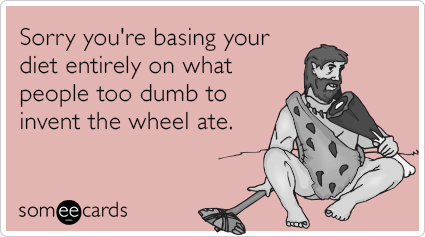Paleo?
Options
Replies
-
Here you go: Personal trainer went Paleo and wrote about it. Great article.
http://healthylivingheavylifting.com/how-clean-eating-made-me-fat-but-ice-cream-and-subway-got-me-lean/
interesting read...thanks for posting...0 -
Here you go: Personal trainer went Paleo and wrote about it. Great article.
http://healthylivingheavylifting.com/how-clean-eating-made-me-fat-but-ice-cream-and-subway-got-me-lean/
Thank you for this.
Great read!0 -
Most people who do "paleo" do not do it solely for weight loss. Weight loss is typically a side effect. (BTW I hate the word paleo, it makes people who have never tried it or even read about it, go on and on about how we don't live in the patholithic period, instead of the real reason to try it, health.) I tell people, I feel best when I eat lots of meat, fats and veggies and when I'm not eating sugar and grains. Diary I can take or leave, it doesn't effect me.
For me, eating this way has:
PROS
- cleared up by depression
- my skin glows
-no headaches
-no joint aches (it used to take me 5 minutes to hobble down the stairs in the AM),
- my TOM is more stable,
-keratosis cleared up,
-chronic sinusitis is gone,
-I have energy
-my bloodwork is AWESOME
-borderline HBP gone
-I'm sure I'm forgetting more
CONS
-lots of cooking and cleaning the kitchen
It is easy to slip up and go back to SAD, however the list of Pros is the reason I always come back to my way of eating.
I reconmend everyone try it for 30 days and make the decision on your own.0 -
I'm going for a 3 mile cycle ride. But because I'm taking my hybrid bike, it's going to be 4 miles, because a mile isn't a mile in all situations.
Hmmm, that doesn't sound right, actually.
since it is a hybrid, would that not make it negative miles?
Don't turn this into a Common Core debate. It's actually going to be purple miles, because his bike likes syrup.0 -
I saw that too.
I came across this: https://www.alcat.com/news/?news_id=469
Might shed some light, as it's an interview.
Hmmm: this one line kinda sticks out: "Can people get away with having some whole grain products? I suspect so. But you have to understand that wheat products represent 20% of our caloric intake in the United States. That's not the way it is around the rest of the world. The Mediterranean diet, for example, does not pound people over the head with soda." Non sequitor much, Dr Perlmutter?
Also, his web site is kinda lite on the science - he links to lots of articles, but he doesn't actually explain anything. Have to buy the book I guess (not going to happen).
Hang on... in the interview, he says:This notion has gained traction and, I think, is profoundly supported by a couple of more recent studies. A study published in August 2013 in the New England Journal of Medicine (NEJM)[2] was very supportive, indicating that even subtle elevations of fasting blood sugar translates to dramatically increased risk for dementia. This was a prospective analysis that measured fasting blood sugar and followed 839 men and 1228 women for a mean of 6.8 years. I'll quote the conclusion: "Our results suggest that higher glucose levels may be a risk factor for dementia, even among persons without diabetes."
Why? These are levels of 105 and 110 mg/dL -- levels that most doctors are going to be satisfied with. However, according to the study, these numbers translated into a significantly increased risk for dementia in individuals who were not demented.
And yet, the very first paper that comes up in the search of Neurology he links to says:Glucose tolerance status and risk of dementia in the community
Neurology September 20, 2011 vol. 77 no. 12 1126-1134
Conclusions: Our findings suggest that diabetes is a significant risk factor for all-cause dementia, AD, and probably VaD. Moreover, 2-hour PG levels, but not FPG levels, are closely associated with increased risk of all-cause dementia, AD, and VaD.
i.e. fasting glucose levels are not linked to dementia.
[Of interest to me, as I have high fasting glucose levels (prediabetes) and I don't want dementia!]0 -
Here you go: Personal trainer went Paleo and wrote about it. Great article.
http://healthylivingheavylifting.com/how-clean-eating-made-me-fat-but-ice-cream-and-subway-got-me-lean/
Thank you for this.
Great read!
Posted to facebook.0 -
I'd certainly agree trying restricting food groups if you've got problems that could be related to an issue with certain foods.I reconmend everyone try it for 30 days and make the decision on your own.
Personally, I'd then try and reintroduce foods slowly to work out what was causing the problem, to better understand the issues I had.0 -
I saw that too.
I came across this: https://www.alcat.com/news/?news_id=469
Might shed some light, as it's an interview.
Hmmm: this one line kinda sticks out: "Can people get away with having some whole grain products? I suspect so. But you have to understand that wheat products represent 20% of our caloric intake in the United States. That's not the way it is around the rest of the world. The Mediterranean diet, for example, does not pound people over the head with soda." Non sequitor much, Dr Perlmutter?
Also, his web site is kinda lite on the science - he links to lots of articles, but he doesn't actually explain anything. Have to buy the book I guess (not going to happen).
Hang on... in the interview, he says:This notion has gained traction and, I think, is profoundly supported by a couple of more recent studies. A study published in August 2013 in the New England Journal of Medicine (NEJM)[2] was very supportive, indicating that even subtle elevations of fasting blood sugar translates to dramatically increased risk for dementia. This was a prospective analysis that measured fasting blood sugar and followed 839 men and 1228 women for a mean of 6.8 years. I'll quote the conclusion: "Our results suggest that higher glucose levels may be a risk factor for dementia, even among persons without diabetes."
Why? These are levels of 105 and 110 mg/dL -- levels that most doctors are going to be satisfied with. However, according to the study, these numbers translated into a significantly increased risk for dementia in individuals who were not demented.
And yet, the very first paper that comes up in the search of Neurology he links to says:Glucose tolerance status and risk of dementia in the community
Neurology September 20, 2011 vol. 77 no. 12 1126-1134
Conclusions: Our findings suggest that diabetes is a significant risk factor for all-cause dementia, AD, and probably VaD. Moreover, 2-hour PG levels, but not FPG levels, are closely associated with increased risk of all-cause dementia, AD, and VaD.
i.e. fasting glucose levels are not linked to dementia.
[Of interest to me, as I have high fasting glucose levels (prediabetes) and I don't want dementia!]
A valuable break down. Thank you!0 -
Anybody here get results on the paleo diet?
Did it for about a year. It was ****ing miserable. Never again.0 -
I like it. It greatly reduces inflammation for me.
What are your symptoms if you eat pro-inflammatory foods?
I do eat dairy, however, avoiding the grains, in particular, gluten has greatly improved quality of life for me.
Some of my "inflammations" are too gross to mention publicly, but common for me are skin rashes, itching, acne, sore tummy, loose stools, stomach ulceration. Ironically I've recently learned that when I do have gluten my teeth (which are already decaying, I've got one root canal, need two more) hurt. I'm not sure if the inflammation is irritating my sinus cavities, tooth decay, or both, but either way I try to avoid gluten like the plague.
I don't mind a sweet or gluten-free cheat every so often for 80/20, but I try real hard to not make it gluten, and really regret it when I do.
*Edit: I'm actually allergic to gluten, which is why Paleo works so well for me, I was gluten free for medical reasons anyways, but sometimes I do have a bit of corn chip or rice noodle which isn't Paleo or Primal but oh well.
So glad you have discovered a way of eating that makes you feel better. WTG!0 -
You don't cut carbs, you get them from vegetables. You are allowed starchy-veggies; I especially like to eat sweet potatoes after weight-training. I love the Paleo diet and how it makes me feel.0
-
My problems with the "paleo" diet is that 1) it's hard to grab a quick meal that falls into the paleo guildlines from a fast food place to eat while driving and 2) I have a major sweet tooth.
I have personaly noticed that if I eat a lot of wheat based food items, I will get hungier faster. The protein and vegetables fill me up and keep be going longer. Plus I get a lot more vitamins from the vegtables then I would with the wheat/grain based foods. I have seen that I don't need to add vitamin C to my diet to keep me healthy. I get it from all of the different foods I eat.
I never thought I would say this, but I like eating brocilli, kale, and asparagus now. I even got my two bachlor neighbors to eat asparagus last night. They thought it tasted good.0 -
You don't cut carbs, you get them from vegetables. You are allowed starchy-veggies; I especially like to eat sweet potatoes after weight-training. I love the Paleo diet and how it makes me feel.
what would be the difference between getting your carbs from whole wheat bread as opposed to vegetables?0 -
You don't cut carbs, you get them from vegetables. You are allowed starchy-veggies; I especially like to eat sweet potatoes after weight-training. I love the Paleo diet and how it makes me feel.
what would be the difference between getting your carbs from whole wheat bread as opposed to vegetables?
 0
0 -
Basically more nutrition, volume, variety and omega 3's to name a few differences.You don't cut carbs, you get them from vegetables. You are allowed starchy-veggies; I especially like to eat sweet potatoes after weight-training. I love the Paleo diet and how it makes me feel.
what would be the difference between getting your carbs from whole wheat bread as opposed to vegetables?0 -
I'm going for a 3 mile cycle ride. But because I'm taking my hybrid bike, it's going to be 4 miles, because a mile isn't a mile in all situations.
Hmmm, that doesn't sound right, actually.
since it is a hybrid, would that not make it negative miles?
Don't turn this into a Common Core debate. It's actually going to be purple miles, because his bike likes syrup.
I almost spit out my coffee on this one. Thanks for the laugh! 0
0 -
Interesting interview with Associate Professor of the University of Miami School of Medicine & board certified Neurologist, David Perlmutter in Medscape (legit Health Professionals' Continuing Ed site)
"Dementia: Is Gluten the Culprit?"
http://www.medscape.com/viewarticle/819232_2
Some comments have a bearing on Paleo-type diet and the false idea that 'a calorie is a calorie is a calorie.'
I get regular news & study updates from the site since I have been in the Health Industry for many years. I'll pass on what stuff may be pertinent to Nutrition, Healthful Eating, Exercise, etc.
Liana
PREVIOUS QUOTES BY OTHER MFP MEMBERS:
LOL and here we go ...
if a calorie is not a calorie, then what is it?
and why would you take diet advice from a neurologist? That would be like asking a pediatrician to perform open heart surgery....
[/quote]END OF QUOTE
I would say you didn't read the article as it has several comments on how glycation of proteins affect our neurological processes. BTW, some pediatricians do perform open heart surgery... Pediatric heart surgeons ...
[/quote]
PREVIOUS QUOTE BY MFP MEMBER:
You have to log in to read, so no, not going to do that right now. Mind posting some Cliff notes?
btw - from the title, it was about dementia, so a neurologist might be a good person to ask!
ETA - he has a website (and a book to sell) http://www.drperlmutter.com/
[/quote]END OF QUOTE
Cliff notes, lol:
Edited by me for brevity as the article runs to 5 pages.
Medscape: For those unfamiliar with your ideas, can you summarize the thesis behind your new book and how you arrived at it?
Dr. Perlmutter: Certainly. I'm a board-certified neurologist and a fellow of the American College of Nutrition. I've been very frustrated with neurology over the past 20 years, because we're trained in residency and practice to basically treat symptoms of neurologic disorders. I found that not to be satisfying and thought it was important to delve into causality as opposed to just focus on treating the smoke and ignoring the fire.
That said, with time we began seeing wonderful research citations that were drawing a link between risk for dementia, for example, and blood sugar levels appearing in our most well-respected journals. For example, a study published in Neurology in 2005[1] pointed a finger squarely at the most powerful metric being glycated hemoglobin. Even back then, it was becoming clearer that there was something going on with blood sugar correlating with rate of brain atrophy, specifically hippocampal atrophy, and cognitive decline. When you now retrospectively evaluate that study, you begin to appreciate that glycated hemoglobin is more than just a metric of average blood sugar, which is typically how it's looked upon even today.
Glycated hemoglobin is a glycated protein. This is a marker not just of average blood sugar, but more important, it's a marker of the degree of glycation that's going on in human physiology -- a process that increases inflammation and dramatically increases the production of free radicals and oxidative stress. So the idea that even subtle elevations of sugar, which is a dietary lifestyle choice, are related to risk for brain degeneration really began to crystallize.
This notion has gained traction and, I think, is profoundly supported by a couple of more recent studies. A study published in August 2013 in the New England Journal of Medicine (NEJM)[2] was very supportive, indicating that even subtle elevations of fasting blood sugar translates to dramatically increased risk for dementia. This was a prospective analysis that measured fasting blood sugar and followed 839 men and 1228 women for a mean of 6.8 years. I'll quote the conclusion: "Our results suggest that higher glucose levels may be a risk factor for dementia, even among persons without diabetes."
Why? These are levels of 105 and 110 mg/dL -- levels that most doctors are going to be satisfied with. However, according to the study, these numbers translated into a significantly increased risk for dementia in individuals who were not demented.
Medscape: What type of diet or interventions do you recommend to prevent or slow dementia?
Dr. Perlmutter: The data show that individuals with lower blood sugar levels have a lower risk for dementia. Therefore, we've got to keep blood sugar low. We do so by using the time-honored dietary intervention of a lower-carbohydrate, higher-fat diet.
This is what the scientists have told us for years is the best way to lower blood sugar. If you look at the A TO Z trial,which was published in JAMA in 2007,[3] dramatic reductions in blood sugar were seen in participants on a lower-carb, higher-fat diet.
A similar article was published in NEJM in 2008.[4] This was an interventional trial demonstrating both weight loss and reduction of fasting blood sugar in individuals eating a higher-fat, lower-carbohydrate diet.
The Mayo Clinic published a study[5] in the Journal of Alzheimer's Disease in 2012 demonstrating that in individuals favoring a high-carb diet, risk for mild cognitive impairment was increased by 89%, contrasted to those who ate a high-fat diet, whose risk was decreased by 44%. Drs. Barnes and Yaffe from the University of California, San Francisco, published a study in Lancet Neurology in 2011[6] indicating that about 54% of cases of Alzheimer disease in the United States could have been prevented with attention to lifestyle changes, such as exercise, weight loss, and controlling hypertension.
This province of lifestyle modification in neurologic diseases has not been one of comfort for neurology in general. We neurologists are acting in an essentially reactionary manner. In other words, we are responding to illnesses by hoping that there are medications to treat symptoms, whereas we really ought to embrace the notion of preventive medicine, because the science is staring us in the face.
Medscape: Why do you feel that gluten is particularly detrimental to our brain health?
Dr. Perlmutter: Gluten-containing foods stimulate inflammatory reactions in a significant number of individuals, well beyond the 1.8% of the population that has celiac disease. This may lead to increased bowel permeability and even increased blood/brain barrier permeability, as described by Dr. Alessio Fasano (formerly at the University of Maryland, now at Harvard).[7] The mechanism deals with the expression of the protein zonulin brought on by gluten exposure. What is so compelling about this newer research is the fact that this reaction to gluten may occur in all humans.
This may explain to some degree the array of neurologic issues now correlated with gluten sensitivity in nonceliac patients, as described by Dr. Anna Sapone and colleagues.[8] So we have to look at gluten sensitivity in a new light, recognizing that its manifestations may extend well beyond the gut. Writing in the Journal of Neurology, Neurosurgery & Psychiatry,[9] Dr. Marios Hadjivassilou stated, "That gluten sensitivity is regarded as principally a disease of the small bowel is a historical misconception. Gluten sensitivity can be primarily and at times exclusively a neurological disease."
That said, many people shop the gluten-free aisle of the grocery store, thinking that those gluten-free breads, pastas, pizza doughs, crackers, and so on are much better because they're gluten-free. The bottom line is these are still powerful sources of carbohydrates.
Even fruit is a source of aggressive carbohydrate in the human diet. Take a simple 12-ounce glass of freshly squeezed orange juice -- what could be better, right? As a matter of fact, that's about 34-36 grams of pure carbohydrates. That's 9 teaspoons of pure sugar with breakfast before your breakfast cereal has even arrived.
My recommendation is to try to keep the total carbohydrates per day to 60-80 grams. If you have 2 glasses of orange juice, you've already consumed 72 grams of pure carbohydrate.
It's really fundamentally important that we address this mechanism of glycation of proteins as being a cornerstone of brain degeneration pathology, and recognize that beta-amyloid itself is a protein that can become glycated and as such can become a powerful nexus for the production of free radicals in inflammation.
We have watched with dismay over the past several years the failure of the drugs designed to rid the brain of beta-amyloid. Most recently, as published in NEJM,[10] a higher dosage of the experimental drug semagacestat was associated with increased cognitive decline of individuals compared with placebo.
Medscape: How does your diet compare with the paleo diet -- the idea that we should be following the presumed diet of Paleolithic humans?
Dr. Perlmutter: They are very similar. It's basically focused on very low carbohydrates and the aggressive addition of good fats: by all means, avoiding modified fats, trans fats, and hydrogenated modified fats, but welcoming back to the table such things as extra virgin olive oil, nuts, seeds, and grass-fed beef (not typical beef).
My diet is not a big beef, go out and eat a lot of meat, kind of diet. When Drs. Campbell and Campbell published The China Study [11] about the possible health consequences of eating meat, their report was valid because by and large, the type of meat that people are eating is derived from animals that have been fed genetically modified corn and soy and high levels of omega-6 fatty acids, which are proinflammatory. Therefore, clearly the idea that there's a relationship between that type of meat consumption and cardiovascular disease, and even cancer, is valid.
We're talking about specifically small amounts of grass-fed beef and wild fish. We're moving the meat, chicken, and fish away from being the centerpiece of the meal to being the side dish, the garnish. Lots of above-ground leafy green vegetables, colorful vegetables, and welcoming back good fats, because that's what the brain is desperate for.
Medscape: So, it's in line with a review published by the American Society for Nutrition[12] last year, as well as other recent data[13] suggesting that a little saturated fat, particularly from free-range red meat, might not be so bad for our brain health and may protect against anxiety and depression?
Dr. Perlmutter: Absolutely. And not just from grass-fed beef, but from the dreaded egg as well. There is no relationship in the current peer-reviewed literature between egg consumption and cardiovascular risk -- none whatsoever. Yet, there is still the ubiquitous egg-white omelet on every restaurant menu that you can find.
Medscape: There are a lot of data on other lifestyle factors with benefits in dementia -- physical activity and mental and social stimulation in particular. How much weight do you give these nondietary factors?
Dr. Perlmutter: We were all over exercise in Grain Brain. One of the notions that I think is very, very empowering and compelling is the idea of neurogenesis -- that humans retain the ability to grow new neurons in the hippocampus throughout our entire lifetime. We can enhance our ability for this activity through the process of epigenetics.
A study published in Proceedings of the National Academy of Sciences in 2011 showed that we can actively modify the gene for the production of brain-derived neurotrophic factor (BDNF) with simple exercise.[14] The investigators looked at 120 elderly nondemented individuals over a 1-year period who either stretched or did aerobics. They measured 3 variables: serum BDNF levels, memory function, and morphometric analysis of hippocampal size on MRI before and after the intervention period. After 1 year, the group that did the aerobic exercise had an increase in hippocampus size by about 1%, improvement of memory function, and higher levels of serum BDNF.
Medscape: What do you say to the fact that many global diets proven to be healthy -- particularly the Mediterranean diet, which is continually shown to be beneficial in numerous medical and mental conditions -- include whole grains? And that many of the world's so-called "blue zones" -- regions in which residents have notably long lifespans -- also include grains in their diets?
Dr. Perlmutter: I think people do tolerate some amount of grains, and that the classic Mediterranean diet is one that has added fat and lower carbs. Of note, an April 2013 article in NEJM [15] compared a standard US diet with a Mediterranean diet supplemented with extra-virgin olive oil and a Mediterranean diet supplemented with mixed nuts. The investigators looked at 3 endpoints: myocardial infarction, stroke, and death. They had to stop the study halfway through it, at 4.6 years, because the individuals with the highest fat consumption had a 30% lower risk for the endpoints. It was unfair to the rest of the participants.
Can people get away with having some whole grain products? I suspect so. But you have to understand that wheat products represent 20% of our caloric intake in the United States. That's not the way it is around the rest of the world.
Medscape: How would you respond to your detractors that there just isn't enough evidence to support would could be considered a somewhat extreme change in our country's dietary habits?
Dr. Perlmutter: My response is that the "extreme change in dietary habits," to quote you, is actually what has happened to human nutrition in only the past several centuries. In the early 19th century, Americans consumed just over 6 pounds of sugar each year. That figure now exceeds 100 pounds. And there has been a dramatic reduction in the consumption of healthful fat. Beyond the mechanism of protein glycation, as well as the powerfully detrimental downstream effects of uncontrolled insulin signaling, we haven't even begun to understand the epigenetic consequences related to the effects of these new dietary challenges in terms of maladaptive genetic expression.
So in reality, I am not suggesting a change. I am recommending that we end this grand experiment and return to a diet that isn't evolutionarily discordant.
WHEW, sorry so long, but I didn't realize not everyone can see the article. Mine opens automatically because I am a member of Medscape.
Liana0 -
Hmm, if you wish you should be able to google studies in the New England Journal of Medicine, Neurology, etc. I can access those from my online library account in BC, Canada. I'm sure others may be able to access published studies as well.
You do realize that he isn't talking about what a lot of people term Paleo diet, he's just saying we have too many carbs in our diets and that is causing inflammation, blood sugar issues, and affecting dementia outcomes for the general population.0 -
My experience without getting high and mighty about it. I have been eating Whole 30 for 3 months now and it works for me personally. I feel great (really great), have a ton of energy ,and I have lost fat and put on muscle during the time I have been doing it. I'm very used to it at this point and have found many things that I really enjoy eating. I don't get incredibly hungry in between meals like I used to when I was eating a lot of carbs and for me a very strict diet works the best.
I have tried to moderate but I had to eventually come to the realization that I have a deeply emotional relationship with food. I would rather eat no pizza than 1 piece, rather eat no chocolate than 1 square because any of it just makes me want it more. That doesn't work for everybody but it really works for me to have established boundaries.
Also, it has been a really great experience learning about the value of fresh food. I am part of a local farmers/ranchers coop that provides me with a weekly supply of fruits/vegetables/meat that comes from within 100 miles of my house. Its been a great chance to learn about seasonality and organic/humanely produced food. I get my eggs from a coworker who has chickens. Its almost a competition to see how fresh I can get my food.
I've seen this elsewhere on here but the only real downside for me is the amount of cooking I have to do. I like cooking but sometimes I don't feel like spending the whole evening making my lunches for the next 3 days. Its worth it for me though.0 -
My experience without getting high an mighty about it. I have been eating Whole 30 for 3 months now and it works for me personally. I feel great (really great), have a ton of energy ,and I have lost fat and put on muscle during the time I have been doing it. I'm very used to it at this point and have found many things that I really enjoy eating. I don't get incredibly hungry in between meals like I used to when I was eating a lot of carbs and for me a very strict diet works the best.
I have tried to moderate but I had to eventually come to the realization that I have a deeply emotional relationship with food. I would rather eat no pizza than 1 peice, rather eat no chocolate than 1 square because any of it just makes me want it more. That doesn't work for everybody but it really works for me to have established boundaries.
Also, it has been a really great experience learning about the value of fresh food. I am part of a local farmers/ranchers coop that provides me with a weekly supply of fruits/vegetables/meat that comes from within 100 miles of my house. Its been a great chance to learn about seasonality and organic/humanly produced food. I get my eggs from a coworker who has chickens. Its almost a competition to see how fresh I can get my food.
I've seen this elsewhere on here but the only real downside for me is the amount of cooking I have to do. I like cooking but sometimes I don't feel like spending the whole evening making my lunches for the next 3 days. Its worth it for me though.
I feel for you on the cooking. I have two little ones and a full time job. I've just changed over to making bulk meals and freezing. It's making all the difference and I'm spending less time and using fewer dishes.0 -
Here you go: Personal trainer went Paleo and wrote about it. Great article.
http://healthylivingheavylifting.com/how-clean-eating-made-me-fat-but-ice-cream-and-subway-got-me-lean/
I just read that article this week. Pretty interesting0 -
:noway:0
This discussion has been closed.
Categories
- All Categories
- 1.4M Health, Wellness and Goals
- 396.5K Introduce Yourself
- 44.2K Getting Started
- 260.8K Health and Weight Loss
- 176.3K Food and Nutrition
- 47.6K Recipes
- 232.8K Fitness and Exercise
- 449 Sleep, Mindfulness and Overall Wellness
- 6.5K Goal: Maintaining Weight
- 8.7K Goal: Gaining Weight and Body Building
- 153.3K Motivation and Support
- 8.3K Challenges
- 1.3K Debate Club
- 96.5K Chit-Chat
- 2.6K Fun and Games
- 4.5K MyFitnessPal Information
- 16 News and Announcements
- 18 MyFitnessPal Academy
- 1.4K Feature Suggestions and Ideas
- 3K MyFitnessPal Tech Support Questions















